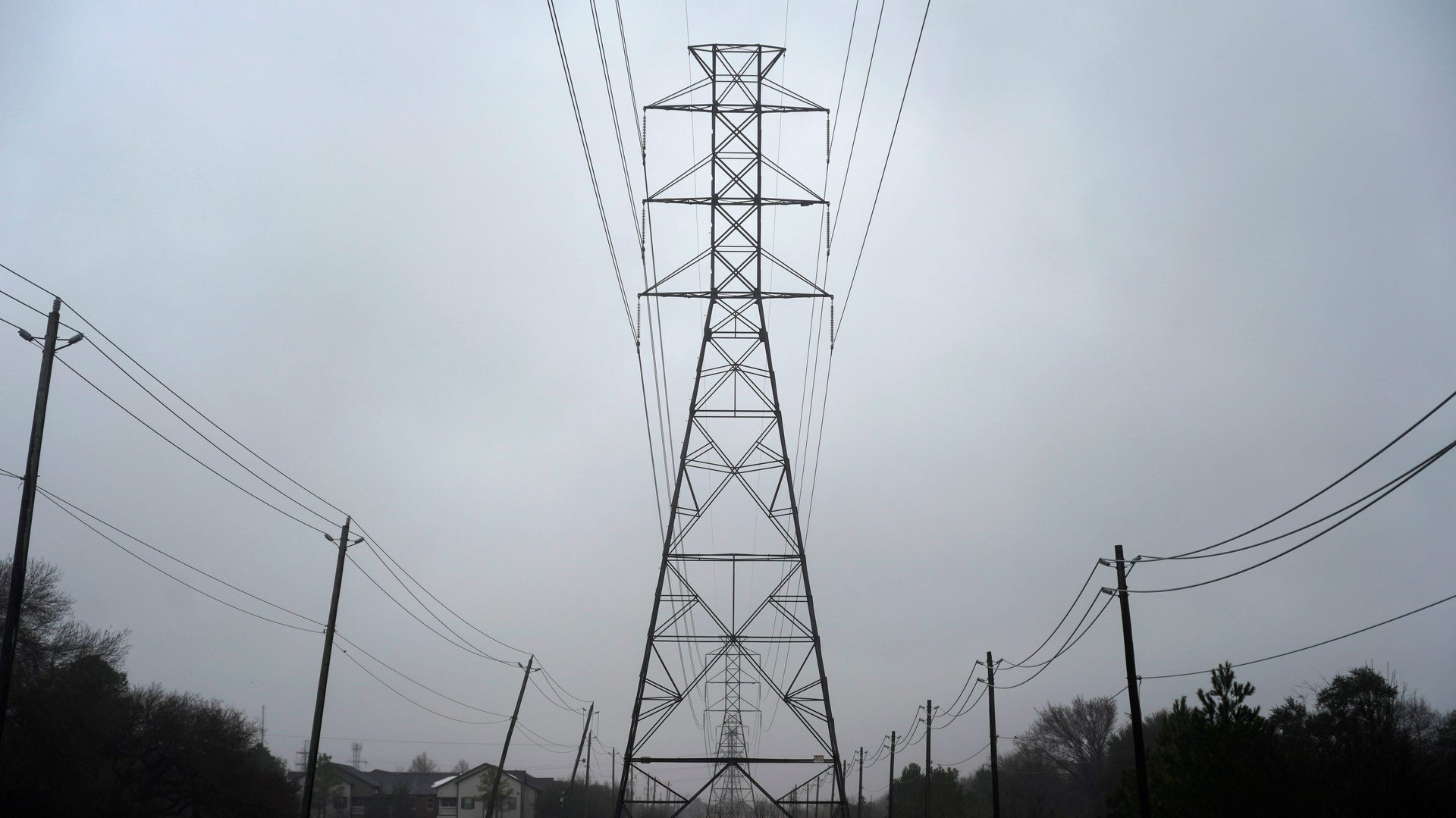Weekend edition—Texas’s power problem, space race redux, goal interrupted
Good morning, Quartz readers!


Good morning, Quartz readers!
When the Texas electric grid crashed this week, fingers pointed faster than guns at a Wild West shootout. Conservative media outlets blamed wind turbines. The Electricity Reliability Council of Texas (ERCOT), which manages the state’s grid, clarified that frozen natural gas pipelines and power plants were really at fault.
But some economists took aim at the market itself. In 1999, Texas joined more than a dozen other states in “deregulating” its electricity system, meaning that it switched from a monopoly power provider to a marketplace of competing power plants and retail utilities. That deregulated market, some say, failed to provide sufficient incentive for companies to invest in winter preparedness.
This argument is missing some nuance. For one thing, this week’s winter storm was truly exceptional in its severity and reach; it’s not clear that even recommendations made (pdf) after a similar 2011 winter blackout could have saved the day. The neighboring grid in Louisiana, which follows a traditional, vertically-integrated, regulated design, also experienced blackouts. Plus, deregulation advanced decarbonization; Texas leads the nation in wind power.
Rather than a truly “deregulated” market, the Texas grid’s participants are still subject to ERCOT and other agencies’ rules. So it’s possible for the state to allow competition while also exercising better oversight. To handle climate change, it will need to do just that.
Regulators could mandate winterization upgrades, revise seasonal expectations, and ensure that not too many plants schedule maintenance at the same time, which was a problem this week. Other deregulated markets in the US also ensure reliability through a so-called “capacity market,” which essentially mandates that a certain amount of power be available. Texas could adopt that, and may also need to build more backup connections to the regional grid.
Can companies be trusted to make these changes on their own, or will they need to be strong-armed? This week, wholesale power prices in Texas went through the roof, which is how deregulation is supposed to incentivize change, said Joshua Rhodes, a University of Texas-Austin energy scholar. Companies will need to decide how climate change affects the likelihood of future paydays, and how much capital spending homeowners and businesses are willing to stomach in exchange for reliability and lower prices during moments of crisis.
“Some power plants have made more money in the past few days than they have in years,” Rhodes said. “Will other companies act on that price signal? It depends how likely they think this is to happen again.” —Tim McDonnell
Five things from Quartz we especially liked
Space race redux. The NASA rover Perseverance alit on Mars this week, only days after the arrival of probes from China and the United Arab Emirates. The trio of missions represents distinct approaches to space exploration, Tim Fernholz explains. The nostalgic US “favors symbolic moonshot projects over cumulative, long-term investment,” while China, with a detailed plan to eclipse American power, and the UAE, with more of a private-sector startup feel, prioritize future economic returns. —Katherine Bell, editor in chief
China doesn’t need Hollywood anymore… Chinese box offices broke all-time records over the Lunar New Year weekend with a $775 million haul, led by homegrown franchise feature Detective Chinatown 3. This is the latest demonstration that China’s film industry is perfectly capable of raking in piles of cash, says Adam Epstein, without importing the Hollywood blockbusters that used to account for nearly half of its revenues. —Nicolás Rivero, tech reporter
…and Hollywood doesn’t need cop dramas. Fossil fuel companies are facing an inflection point: Prepare for a future dominated by renewable energy, or ride oil and gas revenues until they run out. TV networks face a similar decision: Continue catering to lingering broadcast viewers, or invest in strategies that appeal to the cord-cutting audience of the future. As Adam Epstein explains, CBS is proving to be the Exxon of TV, and its addiction to police procedurals—television’s crude oil?—no longer makes sense for its bottom line. —Kira Bindrim, executive editor
Griffin rampant. At the heart of recent market madness is the changing way stocks are traded, exemplified, indeed, driven by one man. Ken Griffin and his company Citadel Securities sit at the middle of 40% of US retail trades. Roya Wolverson profiles the rise of this shadowy financier, the “gulag” culture of his firms, and the massive profits he has earned exploiting the major market trends of the 21st century. —Tim Fernholz, senior reporter
Just the essentials, please. Many readers have told us they’re looking to quickly absorb important and interesting information, and that when we get it right, that’s one of the things they appreciate most about Quartz. So I’m really excited about Essentials: the most pertinent facts, tidbits, statistics, quotes, and questions from the topics we’re obsessing about. It was difficult to pick just one, but I think I learned the most from our Essentials on rethinking cities: from the impact that urbanization has had on the world thus far, to the potential for change in cities of the future. —Sudie Simmons, user insights manager
One membership thing that made us 😘
The billion-dollar question
How can companies make online dating less exhausting?
Deceptive profiles, unresponsive users, scams, racist comments, discrimination, harassment, and profiles that were more confusing or cliché than engaging—these fatiguing aspects of the online dating experience have existed as long as websites have. These downers put people off the apps or sites, which undercuts a company’s bottom line.
So online dating services are looking to make dating online more enjoyable by fostering niche and organic communities, and adding paid features to boost meaningful engagement and visibility with desirable matches. Read more about how dating companies are making online dating less exhausting.
✦ Take your relationship with Quartz to the next level. Swipe right on us and we’ll give you a week free.
We’re obsessed with lidar

A thousand points of light. The human eye sees the world as a constellation of points of light, reflected off objects and translated by the brain into shapes and colors. If we could record and measure those points with a computer, we could learn a lot more about the object: Not just what it looks like, but its precise distance and dimensions, even what it’s made of. That’s the idea behind light detection and ranging, better known as lidar, which was pioneered to study clouds but now used to visualize everything from ice sheets to traffic patterns. The Quartz Weekly Obsession sheds light on the subject.
Get the Weekly Obsession email sent to your inbox, for free!
Five things from elsewhere that made us smarter
Baby bond fever. Once you start looking into solutions that could close the persistent racial wealth gap, it typically doesn’t take long for baby bonds to come up. This piece by Fabiola Cineas for Vox, part of its new series on rethinking policy for Black America, offers a clear explanation for how baby bonds would work, and a compelling argument for implementing them quickly. —Alex Ossola, deputy membership editor
Climate-busting billionaires. Everyone can do little things to fight climate change, like eating less meat or biking instead of driving. If you’re a billionaire, the list might include spending less time on your 500-foot megayacht. That’s the conclusion of Indiana University anthropologists Richard Wilk and Beatriz Barros, who calculated the carbon footprints of 20 top billionaires for The Conversation. The worst offender: Russian-Israeli soccer magnate and ridiculous-yacht-owner Roman Abramovich, whose personal footprint is about 6,000 times higher than the global average. —Tim McDonnell, climate and energy reporter
Mixed messages. The recent protests against Russia’s jailing of Alexey Navalny—president Vladimir Putin’s most high-profile political opponent—have captured the world’s attention. On the one hand, progressive thinkers now believe he deserves the Nobel Peace Prize, but leading journalists have also warned against seeing the problematic politician as a hero, Masha Gessen writes in the New Yorker. Feeling conflicted, Gessen contacted a Russian exile whom they call “the single most insightful scholar of contemporary Russian culture and politics” for some clarification. —Lila MacLellan, senior reporter
Missing goals. Even Lionel Messi can no longer save Barcelona. The world’s most popular soccer team is in financial crisis. The pandemic grinding operations to a halt was bad enough without astronomical salaries, years of poor decisions at the board level, and fierce competition from petrodollar-backed rivals, explain Tariq Panja and Rory Smith in the New York Times. —Hasit Shah, news editor
Clogging goals. As the game of ice hockey became faster and more dangerous, goalies adapted by wearing bigger and bulkier equipment. Those pads and gloves, once designed to prevent broken bones, are now used to block goals, turning the once-athletic goalie into a stationary object. As former NHL goalie Ken Dryden writes in the Atlantic, hockey’s tail is wagging the dog, and the sport needs imaginative solutions to return to its former speed and grace. —Oliver Staley, business and culture editor
Our best wishes for a relaxing but thought-filled weekend. Please send any news, comments, puck thoughts, and Chinese film recommendations to [email protected]. Get the most out of Quartz by downloading our app and becoming a member. Today’s Weekend Brief was brought to you by Tim McDonnell and Susan Howson.